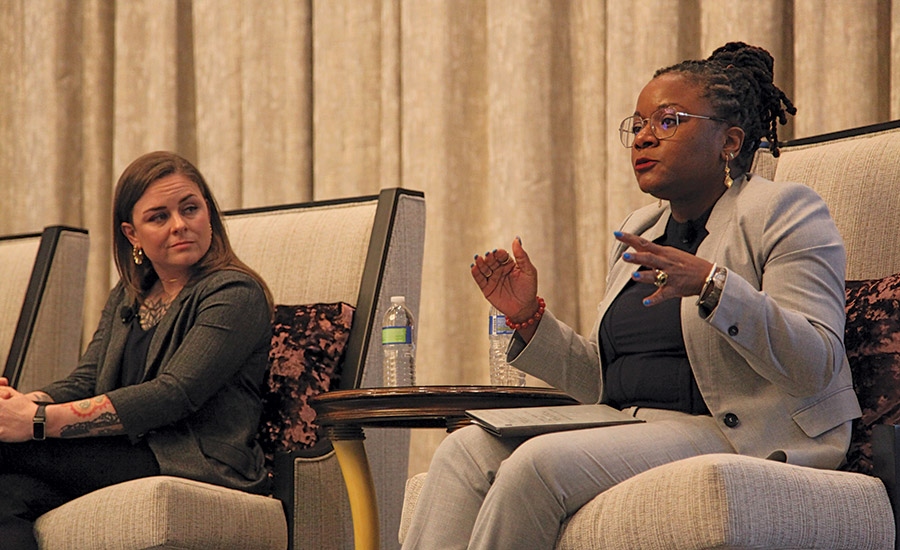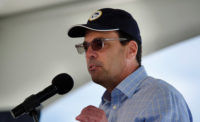
Shawn Wilson
Gathered in a city populated by master musicians and chefs, ENR’s third-annual Top Young Professionals conference attendees absorbed another kind of expertise in New Orleans March 9-10.
Shawn Wilson—who recently relinquished his post as secretary of the Louisiana Dept. of Transportation and Development to run for governor—emphasized inclusion of all parties impacted by infrastructure development. “Change your thinking … how you deliver your jobs, what you are competent in,” he said. “Be intentional.”
While speakers on a panel about measuring success in diversity, equity and inclusion agreed it gets messy, it’s “absolutely worth the investment,” said Lisa Moving, vice president of DEI at Turner Construction. “If it doesn’t get measured, it doesn’t get done,” she said, adding that not everything is as “concrete” as a straight return on investment. Moving pointed to measurable rates of promotion, retention and attrition, and benefits like increased hiring and representation. The hard thing to quantify is “the engagement factor,” she said.
Kabri Lehrman-Schmid, project superintendent at Hensel Phelps, described her firm’s “microaggression training,” which “we renamed 'subtle acts of exclusion training.'” But, she realized, the flipside is that “we also have the power every day to make people feel included,” calling it “microaffirmations—I heard it once, and it made me think of all the ways that I tried to do it.” In a preconstruction meeting, for example, when a third-party inspector is meeting the safety representative for the owners, they might not feel like part of the team. “I can very easily create a bridge just by asking, ‘Do you have anything?’”
Bouncing Back
Launching her talk on bouncing back from burnout, Lauren Ruth Martin, licensed therapist and owner of Novel Consulting, polled audience members on their burnout levels. The result: mostly fresh, but some burnout was starting to take hold.
“So many of us on a day-to-day basis are having these internal struggles: to either find purpose or to play it safe, to keep our head down and keep grinding or to speak up, to find a life that is one of survival or one of flourishing,” she said. “At the end of the day … we all deserve a life with more kindness, flexibility and empathy.”
When many people reach 40%-60% burnout, they overcompensate and lean in to their coping mechanisms until they get all the way back down to 0%, Martin says, instead of building a sustainable practice to manage burnout.
Attendees also heard a sobering session on lessons learned from the 2018 pedestrian bridge collapse at Florida International University in Miami. Aaron Mann, a principal at Terracon Consultants—a firm not involved in the project—said the engineering community “must not move on” but rather “learn from the mistakes.” He described the investigation, which included an NTSB finding that it could not find a bridge design like one that collapsed anywhere in the world. Designed to look like a cable-stayed bridge, it was actually a non-redundant truss bridge with hollow steel pipes that provided no support.
After destressing certain diagonal braces on March 10, post-tensioning subcontractor Structural Technologies/VSL noted consequent cracking and texted photos to contractor Munilla Construction Management (MCM), which forwarded them to designer FIGG for comment. On March 13, FIGG responded that plastic shims should be installed but that “we do not see this as a safety issue.” VSL was instructed to restress post-tensioned rods at the location but couldn’t do so until March 15.
MCM called a meeting on March 15 regarding the growth of the cracks and VSL commenced post-tensioning work that day. Then, the span collapsed and fell 18 ft, killing six people including a VSL technician, and permanently disabling another VSL worker.
While a global settlement was quickly reached by most of the parties involved, the independent peer review checker Louis Berger declined until January 2022, claiming that it had only been charged with reviewing final design, not staging design. But in 2022 a judge allowed a jury to consider punitive damages for the firm, which then settled.
The firm had a point, being cited “for not doing work it was not hired to do,” Mann pointed out.
However, the Florida Dept. of Transportation also never questioned the independent review although it was protected under sovereign immunity. Mann said he believes that all parties involved must have wished they acted differently. He urged attendees to always ask themselves “Can I do more?”








